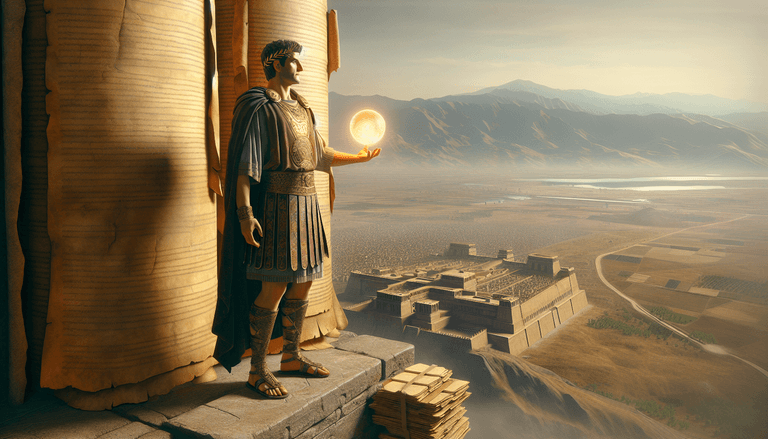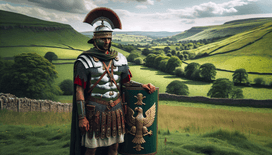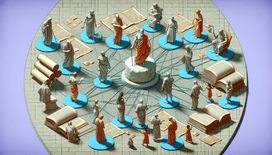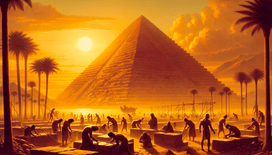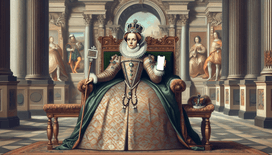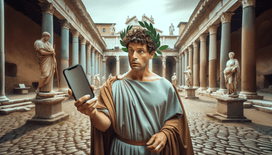Picture this: Alexander the Great, the man known for both his military prowess and his insatiable curiosity, standing atop a hill overlooking his empire with a trusty smartphone in hand. The sun setting behind him, he peers into his digital companion and issues a command that sends shivers through the annals of history: "Okay Google, translate this!"
Yes, dear reader, today we delve into a world where the Macedonian king wielded not a sword, but Google Translate, a modern marvel that could have been the wind beneath his imperial wings. How might Alexander's conquests have played out with the pocket-sized power to transcend language barriers at his fingertips?
Lost in Translation? Nay, Says Alexander!
By 331 B.C., Alexander had already made short work of most of the ancient world's major players, but his biggest enemy wasn’t an army, it was Google's modern-day equivalent: language barriers.
The Persian Empire, with its dizzying array of languages, must have been akin to an indecipherable wall of text, each city a new puzzle of foreign tongues and accents. Now, imagine Alexander strolling into Babylon or the plush city of Persepolis, smartphone in hand, as local governors mutter in confusion,"Is this chap lost?" But no, with a swipe and a tap, he's demystifying their guttural growls and nasal nuances into crisp Macedonian.
“Speak friend, and enter,” he might have quipped, paraphrasing his less witty IRL advisors. "Apologies for conquering your city; I've just translated it all, and it says you were expecting me. Care for some hummus?"
The Art of Diplomacy Reimagined
While military might wasn't one to be understated, Alexander was as much a diplomat as a warrior. Rather than clumsily employing translators who might inadvertently declare war instead of discussing trade relations (because if the sword doesn’t kill you, the translation error just might), Google Translate could have been his ace up the toga.
"Dear Darius," he types, keying in a request to WhatsApp, "Let's Google Hangout over a peace treaty. PS: bring dat Persian rug I liked! 😂"
Refreshed by this newfound ability, political negotiations might have taken on the character of a lively text chat. By lacing his imperial decrees with emojis and memes, Alexander could lightheartedly coax submission from his subjects with a virtual twinkle in his eye.
From the Hellespont to the Himalayas, with Hyperlinks
Let us not forget the educational angle. With the innate knowledge and cultural insights of a thousand lifetimes nestled amid his apps, Alexander could have been equal parts conqueror and curator. Imagine his troops, eyes wide and scrolls rolled, as he pases to quote Persian poetry verbatim or to provide footnotes on the architectural designs of newly besieged cities, linking to Wikipedia and tossing in a few TED Talks for good measure.
The thorny challenge of assimilating diverse cultures becomes a breezy opportunity for cross-cultural enlightenment. Thus, the Great Library of Alexandria might well have included a section entitled "Google Masterpieces: Unboxed".
An Empire United by the Internet
Imagine the Hellenistic world’s great cities, Alexandria, Tyre, and Bactra, all connected via a harmonious hubbub of wireless connectivity. Thanks to Alexander's innovative use of Google Translate, they aren’t just vassals to his imperial crown but vibrant nodes in a truly global network.
Hopscotching from policy making to sharing hilarious Snapchat filters with his generals, an empire of seamless communication rapidly forms, a mingling of minds suitably suited for everything from the scientific to the silly. "See you at the symposium, bring Cato, will ya? I've got just the meme!"
In Conclusion: A Babel-Conquering Visionary
So, what might a world look like, had Macedon's megastar harnessed modern technology to conquer language as well as lands? From military marvel to meme-lord monarch, Alexander could have well bypassed history's worst pothole: misunderstandings.
The result would be a civilisation unlike any other, one of dialogue without discord, of alliances forged in friendship, not fealty. Though alas, dear reader, this tale is but a flight of fancy on Timewarp Terry’s digital parchment, let us cherish what-ifs a moment longer, and wonder what a snap, tap, and remark from history’s greatest bridge-burner might have birthed, with a smartphone in hand.
